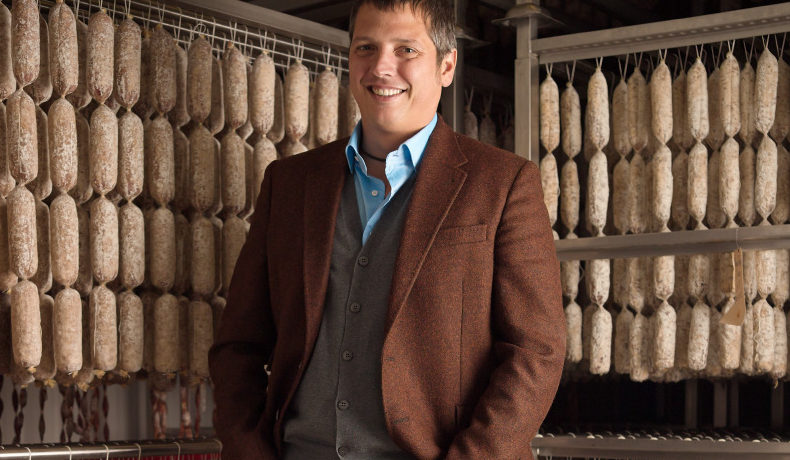By Jeff Kelley
“National?” I reply to Oliviero “Olli” Colmignoli. I could’ve sworn he’d just said his two-year-old company’s artisanal salames are available nationwide in Whole Foods Markets.
Yes, he confirms “National.”
From this unsuspecting factory in a row of nondescript office suites in Mechanicsville, the two dozen employees of Colmignoli’s namesake Olli Salumeria output 20,000 pounds of hog shoulders each week to create various forms of salame, the Italian (and Olli) spelling of the more familiar American term.
But Olli Salumeria’s products are “not the other white meat,” explains the 34-year-old Colmignolia, referring to the lengths the company goes in order to find the highest-quality raw materials: hogs. The company has gone far and wide to uncover hogs with good genetics, from family farmers, and nourished with high-quality natural feeds. They found the rare Mangalitsa pig from Mosefund Farm in New Jersey, dark, well-marbled pork raised outdoors on a sixth-generation Iowa farm, and clean-tasting shoulders and hams from Canadian farms.
The outcome of careful sourcing and a thoughtful manufacturing process has created demand for Olli that has sometimes outstripped supply, write-ups in Bon Apetit and the Wall Street Journal, and an influx of major U.S. retail partners since the company began selling in spring 2011. Sales are strong but private, and once indifferent Americans are paying around $10 for little salames, allowing the company to increase capacity by 30 percent in
“We scraped by this holiday season (with enough supply), which for us is the most important season,” Colmignoli says. “One of the problems that really squeezed us was finding enough raw materials to fulfill demand. We were buying everything we could when we could, essentially.”
The business of cured meats is Colmignoli’s heritage.
A Rome native, the father of two was born into a family of salame makers. His father immigrated to Colonial Heights in the mid-1980s to start the U.S. subsidiary of the 163-year-old family business, Fiorucci Foods, now part of Europe’s Campofrio Food Group.
Back in 1986, he says, the U.S. market wasn’t ready to pay the cost required to produce traditional Italian meats, so Fiorucci stuck to the more cost-friendly commodity salamis, pepperonis, and various Italian meats. Colmignoli worked at Fiorucci before partnering with local investor Chip Vosmik in 2010 to create more traditionally made cured products.
“We try to be as traditional as possible but use the most modern techniques in manufacturing,” Colmignoli says. The traditional part means using low temperatures – 72 degrees Fahrenheit – to dry the salame. Several rooms within the factory contain thousands of salames hanging from ceilings, where they remain for five to six weeks to get their taste. The salame ferments and actually grows a layer of mold: “‘good mold’ to prevent ‘bad mold’,” he explains.
“The challenge is getting people to taste it,” Colmignoli says. “Americans are not used to having mold on their meat whatsoever, and we actually put it on there.”
The salames are encased in a collagen-coated mesh known as Hukki, which is peeled off before eating. The meats are then wrapped in a parchment wrapper containing an inner barrier of protective film, and each package is flushed with gas to push out the oxygen to make the container airtight.
Olli salame is sold on its website, at Wegmans, Whole Foods, and online at Williams-Sonoma, among other retailers. In Greater Richmond, you’ll find them in Ellwood Thompson’s, Belmont Butchery, and Secco Wine Bar. Whole prosciuttos – the hog’s butt – are sold separately online, for upwards of $400, due to a delicate aging process that lasts 16 months.
Olli approached Secco as an initial customer, and the Carytown wine bar serves the company’s prosciutto, wild bar salame, and bresaola salaes. “We really liked what we tasted,” says executive chef Tim Bereika, who runs a restaurant known for setting the bar high on the wine, cheese, and meat it serves. Regarding the prosciutto, in particular: “They don’t try to do anything flashy with it. It’s just a high-quality piece of meat, monitored closely and prepared properly. And we love it.”
Colmignoli plans to increase manufacturing five-fold over the next five years to 100,000 pounds of salame a week, hoping that American demand for high-quality cured pork will grow with his company.
“There is a consumer out there who will pay the kind of price we want,” he says. And he has faith that there will be five times that many consumers in a few years. And why wouldn’t he? “The business is my life.

